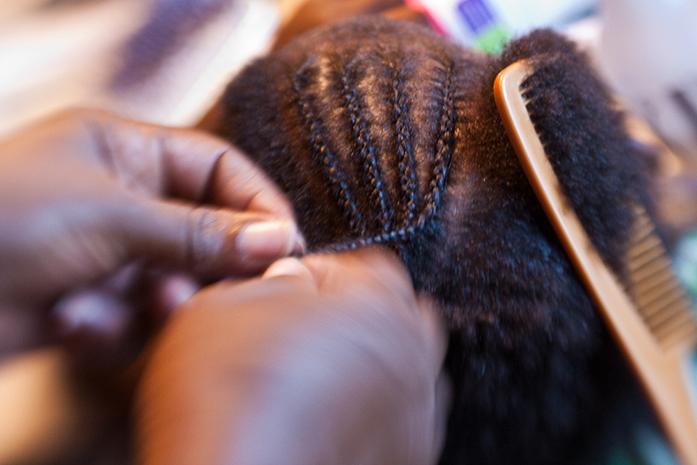By Emily Kresse
Hair-braiders in Iowa are no longer required to receive a cosmetology license in order to make a living after Gov. Terry Branstad signed a bill on the matter this year.
Iowa hair-braiders were liberated from the requirement to have an Iowa cosmetology license by the law, which took effect July 1.
Previously under Iowa law, men and women interested in providing hair-braiding services were obligated to go through a 2,100-hour licensing program, which can cost up to $22,000.
The Institute for Justice, a national public-interest law firm based in Virginia, filed a lawsuit on behalf of Aicheria Bell and Achan Agit in October 2015.
When the hair-braiding bill was passed toward the end of the last legislative session, the institute wrote a letter to Branstad’s office asking him to line-item veto the continuing-education requirement and the section that gave the Department of Health direct authority over hair-braiders.
The bill exempted hair-braiders from the 2,100-hour requirement but replaced it with an annual class and for hair-braiders to be subject to discipline under the Department of Health. Branstad line-item vetoed the sections of legislation that kept natural hair-braiders under the direct jurisdiction of the Department of Health and required them to take an annual course.
In his veto statement, the governor called the requirements for hair-braiders unnecessary and promised to work for other types of workers facing similar license requirements.
“Occupational licenses decrease incomes for working Iowans and increase costs for consumers,” the statement read. “I look forward to continuing to work with the Legislature to find other commonsense solutions in reducing unnecessary regulatory burdens and licensing fees on hardworking Iowans.”
Natalie Eden, a student at La’ James International College, 227 E. Market St., said that although braiding hair is touched on, she has not had formal training. While this change in legislation may hurt licensed salons’ business, she said, ultimately, she believes hair-braiders should not have to go through a license program.
“That’s something [hair-braiders] learn growing up from their families,” Eden said. “It doesn’t make sense to go to school to just do one facet of something they could do better than the school can teach.”
Bell practiced natural braiding hair while living in Minnesota, but when she moved to Iowa, she discovered the steep license requirements in addition to enrolling in cosmetology school in order to legally provide hair-braiding services.
“She was a single mother, she already knew how to braid, it didn’t make sense for her to stop working and spend thousands of dollars and hundreds of hours learning skills she already knew that, honestly, the cosmetology schools didn’t even teach,” said Meagan Forbes, her attorney from the Institute for Justice.
The new legislation has been liberating, Bell said, noting she looks forward to being able to advertise openly and expand her business.
“I’ve been here the last two years and working in fear,” she said. “I’m just happy I can earn an honest living and not have to worry about being a criminal.”
Bell and Agit have dropped their lawsuit against the state since the new law went into effect. Iowa is one of 20 states that have exempted hair-braiders from licensing requirements, according to the Institute for Justice’s website.
“This is a complete victory for braiders in Iowa, but there’s still a lot of work to be done in other areas; Iowa licenses more workers than any other state,” Forbes said. “We think there’s more work to do in Iowa.”







